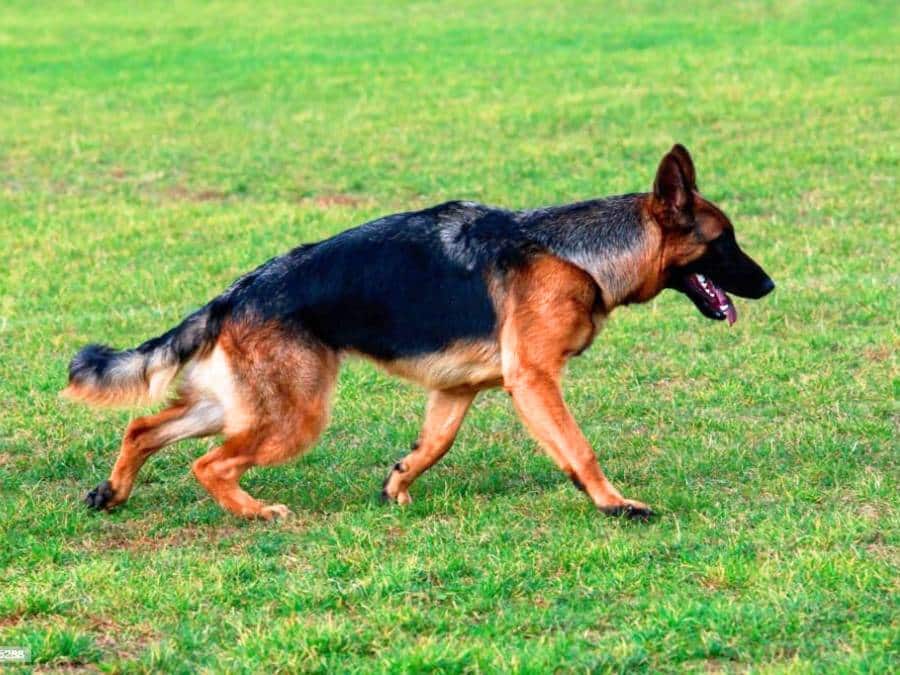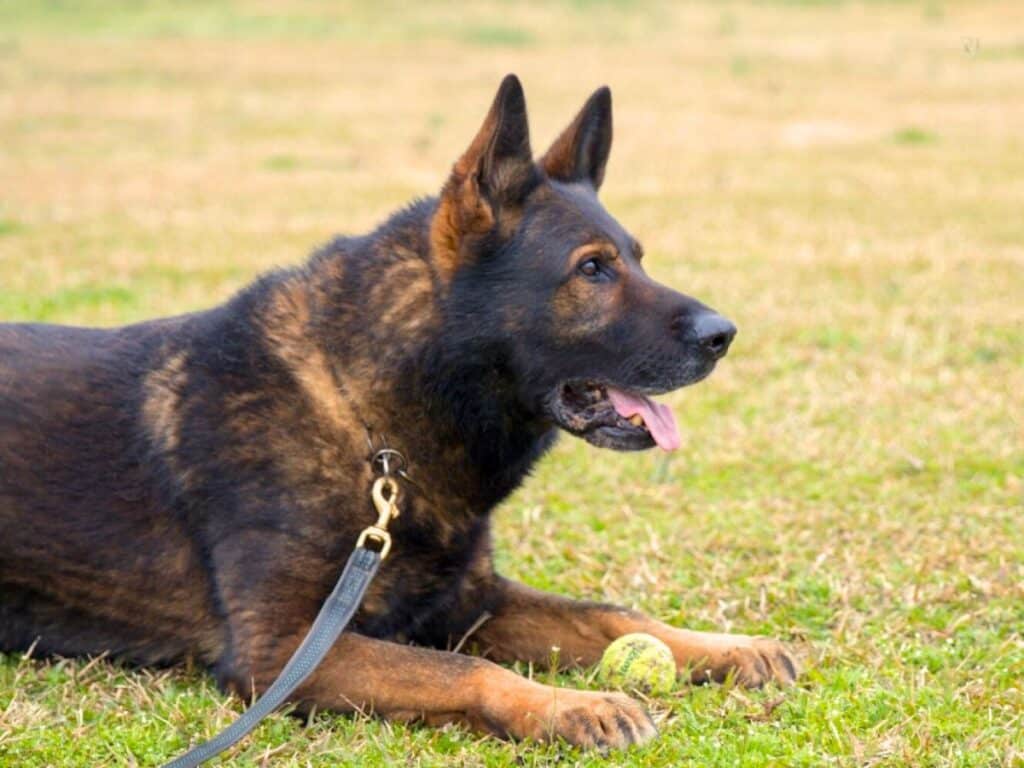Is your German Shepherd looking a little on the thin side? It’s natural to worry when our furry friends aren’t at their ideal weight. A skinny German Shepherd can be a cause for concern, as it may indicate underlying health issues that need attention. But fear not! By understanding the reasons behind your dog’s thinness, you can take steps to address the problem and ensure their well-being.
In this post, I’ll provide guidance on addressing this issue so that you can help your beloved companion reach an optimal weight. So let’s dive right in and unravel the mystery behind why your German Shepherd might be so skinny!
Why is my German Shepherd so Skinny? 9 Possible Reasons
There are several possible reasons why your German Shepherd may be skinny. It’s important to note that every dog is different, and what may be considered skinny for one dog may be normal for another. However, if you’re concerned about your German Shepherd’s weight, here are some potential explanations:
1. Insufficient calorie intake compared to their energy expenditure

One of the most common reasons why your German Shepherd may be skinny is because they are not consuming enough calories to meet their energy needs.
These dogs are known for being active and energetic, requiring a substantial amount of food to fuel their daily activities. If you notice that your German Shepherd is losing weight despite eating normally, it could be due to an inadequate calorie intake.
German Shepherds have high metabolic rates, which means they burn calories quickly. If they don’t consume enough food to compensate for this energy expenditure, they will begin to lose weight.
To address this issue, make sure you are feeding your dog a balanced diet that meets their nutritional requirements. Consult with your veterinarian to determine the appropriate portion sizes and types of food that will help your GSD maintain a healthy weight.
RELATED: How Much To Feed a German Shepherd Puppy: GSD Feeding Chart
2. Medical conditions like thyroid problems or malabsorption issues
In some cases, weight loss in German Shepherds can be attributed to underlying medical conditions such as thyroid problems or malabsorption issues.
The thyroid gland plays a crucial role in regulating metabolism, and if it is not functioning properly, it can lead to weight loss despite normal food consumption.
Malabsorption issues occur when the body is unable to absorb nutrients from the food properly.
This can result in poor weight gain or even weight loss over time. If you suspect that your German Shepherd’s thinness is caused by a medical condition, it is important to consult with a veterinarian for proper diagnosis and treatment options.
3. Dental problems affecting eating habits
Dental problems can also contribute to weight loss in GSDs. If your dog has dental issues such as gum disease or broken teeth, it may experience pain while eating. This discomfort can lead to reduced food intake and subsequent weight loss.
To ensure that dental problems do not hinder your German Shepherd’s ability to eat properly, regular dental care is essential. Brush your dog’s teeth regularly and schedule professional dental cleanings as recommended by your veterinarian.
By maintaining good oral hygiene, you can help prevent dental issues that may affect your German Shepherd’s eating habits.
4. Intestinal parasites depriving essential nutrients

Intestinal parasites such as worms can be a hidden cause of weight loss in German Shepherds. These parasites live in the digestive tract and feed off the nutrients consumed by your dog.
As a result, your German Shepherd may not be receiving all the essential nutrients it needs to maintain a healthy weight.
Regular deworming is crucial to prevent and treat intestinal parasite infestations. Consult with your veterinarian to establish an appropriate deworming schedule for your dog based on its lifestyle and risk factors.
By keeping these pesky parasites at bay, you can ensure that your dog receives the necessary nutrients for optimal health.
5. Stressful living environment
Stressful environments or anxiety-inducing situations can have a profound impact on a German Shepherd’s appetite and subsequent weight loss. Dogs, just like humans, can experience stress that affects their overall well-being.
If your GSD is exhibiting signs of anxiety or stress, such as decreased appetite or excessive panting, it is essential to address the underlying cause. Creating a calm and secure environment for your furry friend can help alleviate their stress levels and promote healthy eating habits.
RELATED: How To Help Your GSD Overcome Separation Anxiety
6. Genetics
Certain genetic factors can contribute to a GSD being naturally skinny. These factors can include the dog’s metabolism, body type, and overall genetic makeup.
Dogs with a faster metabolism may find it more challenging to gain weight and maintain a higher body fat percentage, resulting in a leaner appearance.
Genetics determine the distribution of muscle and fat in the dog’s body. Some GSDs may have a genetic predisposition to have less muscle mass and a lower percentage of body fat, resulting in a skinny appearance.
7. Age
As our beloved German Shepherds grow older, they tend to become less energetic and may not eat as much as they used to. This is completely normal and happens to most dogs. You see, just like humans, dogs can also experience dental issues as they age.
These dental problems can make it difficult for them to chew their food properly, which can lead to a decrease in appetite. And when they eat less, their bodies don’t get the necessary nutrients, causing them to appear skinny.
But wait, there’s more! Unfortunately, as our furry friends get older, they become more susceptible to various health issues, including cancer. Yes, you heard it right – even dogs can develop cancer. This dreadful disease can affect their overall health and cause weight loss.
RELATED: German Shepherd Health Issues: Symptoms & Treatments
RELATED: German Shepherd Cancer Symptoms
8. Poor eating habits
Fussy eating is something many owners have to deal with at some point. If a dog has poor eating habits, such as consuming an inadequate amount of food, being a picky eater or eating low-quality food, it can lead to them being skinny or underweight.
When a dog does not receive enough nutrients and calories from their diet, it can result in a lack of muscle mass and a decrease in body weight. This can make the German Shepherd appear skinny or emaciated. Additionally, poor eating habits can also affect their energy levels and overall vitality.
Fussy eating or a lack of proper nutrition can weaken the immune system of a GSD, making them more susceptible to illnesses and diseases. It can also affect their coat quality, leading to a dull and unhealthy-looking coat. Poor eating habits can also impact their digestion, causing issues like diarrhea or constipation.
Click here to learn more about the causes and treatment of diarrhea in German Shepherds.
9. Neglect or inadequate care prior to adoption
If you recently adopted a GSD and notice that it is skinny, it could be due to neglect or inadequate care before joining your family. Some dogs may have experienced periods of insufficient food or lack of proper nutrition, leading to weight loss.
In such cases, providing a loving and caring environment along with a nutritious diet can help your GSD regain its ideal weight. Gradually introduce high-quality food into their diet and monitor their progress closely. With time, patience, and proper care, you should see improvements in their overall health and weight.
How To Tell If Your German Shepherd is Actually Skinny
One important aspect to consider is their body condition. Evaluating the body condition of your furry friend involves assessing their overall appearance and physical characteristics.

Key indicators for evaluating body condition
To determine whether your German Shepherd is at a healthy weight or if they are too skinny, there are several key indicators you can look out for. These include feeling their ribs, observing their waistline, and examining their muscle tone.
- Feeling the ribs: Gently run your hands along the sides of your German Shepherd’s chest area. A healthy dog should have ribs that are easily felt but not overly prominent or completely hidden under layers of fat. If you can see the ribs protruding prominently, it may indicate that your dog is underweight.
- Observing the waistline: When viewed from above, a healthy German Shepherd should have a slight waistline between the ribcage and hips. This means that there should be a visible tapering inwards behind the ribs towards the hips. If there is no discernible waistline or if it appears sunken in, it could be an indication that your dog is too skinny.
- Examining muscle tone: Assessing the muscle tone of your German Shepherd can also provide insights into their body condition. A well-conditioned dog will have firm muscles with defined contours throughout their body. Lack of muscle definition or visible wasting in certain areas may suggest that your dog is not getting enough nutrition or exercise.
Understanding a healthy body condition
By familiarizing yourself with what constitutes a healthy body condition for a German Shepherd, you can better gauge whether your furry companion requires intervention due to being underweight.
A healthy German Shepherd should have moderate fat cover over their ribs and spine. While you should be able to feel the ribs easily, they should not be sticking out excessively. Similarly, the spine should not be overly prominent or easily visible.
In addition to these physical indicators, it is important to consider your dog’s overall activity level and energy levels. If your German Shepherd is experiencing a sudden decrease in energy or seems lethargic, it could be a sign of an underlying medical condition contributing to their weight loss.
RELATED: Why is My German Shepherd So Small?
Identifying symptoms of underweight dogs
If you suspect that your German Shepherd is underweight, there are certain symptoms you can look out for as further indications:
- Visible ribs: As mentioned earlier, if the ribs are prominently visible even without palpation, it may indicate that your dog is too skinny.
- Sunken abdomen: When looking at your German Shepherd from the side, if their abdomen appears sunken or concave rather than having a gentle tuck-up behind the ribcage, it suggests a lack of body fat.
- Lack of muscle definition: A dog that lacks muscle tone and definition throughout their body may be underweight.
- Decreased appetite: If your German Shepherd suddenly loses interest in food or experiences a significant decrease in appetite, it could contribute to weight loss.
- Low energy levels: Dogs that are underweight often exhibit decreased energy levels and may seem less active than usual.
It is essential to consult with a veterinarian if you notice any concerning symptoms in your German Shepherd. They will be able to assess your dog’s overall health and determine whether there is an underlying medical condition contributing to their weight loss.
RELATED: Dwarf German Shepherd: Pictures, Traits & Price
Ideal weight for German Shepherds
There are a few factors to consider. The weight of a German Shepherd can vary depending on their age, sex, and activity level. It’s important to keep in mind that every dog is unique, so their ideal weight may differ from others.

Factors Affecting Ideal Weight
German Shepherds come in different sizes and builds, which means their optimal weight can vary. Adult male German Shepherds typically weigh between 65 to 90 pounds (29 to 41 kg), while females range from 50 to 70 pounds (23 to 32 kg). However, these ranges are just general guidelines and should not be considered as strict rules.
Considering your specific dog’s build and genetics is crucial when determining their ideal weight. Some German Shepherds may naturally have a leaner or more muscular physique compared to others.
Consulting with a veterinarian who is familiar with the breed can provide valuable guidance in establishing an appropriate target weight for your individual German Shepherd.
RELATED: German Shepherd Growth & Weight Chart
Importance of Maintaining a Healthy Weight
Maintaining a healthy weight is essential for your German Shepherd’s overall well-being. An overweight or underweight dog can face various health issues that may affect their quality of life. Striving for an ideal weight will help ensure your furry friend stays healthy and happy.
Here are some reasons why maintaining a healthy weight is crucial for your German Shepherd:
- Joint Health: Excess weight puts additional strain on joints, increasing the risk of joint problems such as hip dysplasia or arthritis. Keeping your dog at an appropriate weight helps reduce stress on their joints and promotes better mobility.
- Energy Levels: Proper nutrition and exercise contribute to higher energy levels in dogs. If your German Shepherd is overweight, they may experience fatigue more quickly during physical activities. On the other hand, if they are underweight, they may lack the energy required for an active lifestyle.
- Digestive Health: Maintaining a healthy weight helps support proper digestion and prevents gastrointestinal issues. Overweight dogs are more prone to digestive problems like bloating or constipation, while underweight dogs may have difficulty absorbing essential nutrients.
- Lifespan: Studies have shown that maintaining a healthy weight can increase a dog’s lifespan. Obesity has been linked to various health conditions, including diabetes, heart disease, and certain types of cancer. By keeping your German Shepherd at an ideal weight, you can help reduce the risk of these serious illnesses.
Achieving the Ideal Weight

To help your German Shepherd achieve their ideal weight, consider the following tips:
- Balanced Diet: Feed your dog high-quality dog food that is appropriate for their age and activity level. Avoid overfeeding or free-feeding, as it can lead to weight gain. Consult with your veterinarian to determine the right portion sizes for your German Shepherd.
- Regular Exercise: Engage your German Shepherd in regular physical activities such as daily walks, playtime, or training sessions. Exercise not only helps burn calories but also promotes muscle development and overall fitness.
- Monitor Treats: While treats can be a great way to reward your furry companion, excessive treats can contribute to weight gain. Choose low-calorie treats or opt for healthier alternatives like carrot sticks or apple slices.
- Veterinary Guidance: Regularly visit your veterinarian for check-ups and discuss any concerns regarding your German Shepherd’s weight. They can provide professional advice tailored to your dog’s specific needs and monitor their progress over time.
Remember that achieving an ideal weight takes time and consistency. It’s important not to rush the process but rather focus on gradual and sustainable changes in diet and exercise routines.
How to Fatten Up a German Shepherd
If you’re wondering, “Why is my German Shepherd so skinny, and what you can do to help them gain some weight and achieve their ideal body condition? Here are some tips and guidelines to help you fatten up your furry friend:
1. Consult a veterinarian
Before making any changes to your German Shepherd’s diet or exercise routine, it’s important to consult with a veterinarian. They can assess your dog’s overall health and provide specific recommendations tailored to their needs.
2. Increase portion sizes

If your German Shepherd needs to gain weight, consider gradually increasing their portion sizes. This can be done by adding a little extra food to their meals or switching to a higher-calorie dog food formula. Make sure to choose a high-quality, balanced diet that meets their nutritional requirements.
3. Add healthy fats
Including healthy fats in your dog’s diet can help them gain weight in a healthy way. You can add a small amount of olive oil, coconut oil, or fish oil to their meals. These fats are not only calorie-dense but also provide essential nutrients for their overall well-being.
4. Choose protein-rich foods
Protein is essential for muscle development and weight gain. Opt for dog food formulas that have a higher protein content. Additionally, you can supplement their diet with lean meats like chicken or turkey. Cook the meat thoroughly and remove any bones or seasoning before serving.
5. Offer frequent meals
Instead of feeding your German Shepherd the standard two meals a day, consider dividing their daily food intake into smaller, more frequent meals. This can help increase their calorie intake and provide a steady supply of energy throughout the day.
6. Give them healthy treats

If you’re wondering why your German Shepherd is so skinny, one way to address this concern is by enhancing their meals with nutritious treats. Adding these tasty morsels to their regular diet can help increase calorie intake without overloading their stomach. Opt for treats that are rich in protein, healthy fats, and vitamins to ensure they’re getting a well-rounded boost of nutrition.
7. Wet food as a treat option
In addition to traditional dry kibble-based treats, wet foods can also be a great option for enhancing your dog’s meals. Wet dog food is often more palatable and can entice even the fussiest eaters. It provides extra moisture and can be mixed with dry kibble or served separately as a special treat.
8. Avoid excessive exercise
While exercise is important for a German Shepherd’s overall health, excessive exercise can burn off the extra calories they need to gain weight. Limit intense physical activities and focus on low-impact exercises like short walks or gentle play sessions.
9. Monitor their progress
Keep track of your German Shepherd’s weight gain progress by regularly weighing them and assessing their body condition. If you’re unsure about their progress or have any concerns, consult with your veterinarian for further guidance.
Remember, it’s important to approach weight gain in a healthy and gradual manner. Rapid weight gain can lead to health issues, so be patient and monitor your German Shepherd’s progress along the way. With proper care and nutrition, you can help your furry friend achieve their ideal weight and maintain a healthy lifestyle.
Addressing Stress and Anxiety in Skinny German Shepherds
Just like humans, dogs can experience emotional turmoil and depression that affects their physical well-being. One possible reason for your German Shepherd to be skinny could be stress and anxiety.

Identifying potential stressors in your dog’s environment
It is important to identify potential stressors in your German Shepherd’s environment to understand the root cause of their weight loss. Common triggers may include loud noises, changes in routine, separation from loved ones, or even a new pet joining the household.
Take some time to observe your dog’s behavior closely. Are they constantly pacing or panting? Do they seem restless or easily startled? These signs may indicate underlying anxiety. Pay attention to any recent changes in their routine or surroundings that might have triggered these feelings.
Providing a calm and secure living environment
Ensure that your dog has a designated space where they feel safe and comfortable. This could be a cozy corner with their bed or crate, away from any sources of noise or commotion. Minimizing exposure to stressful stimuli such as loud music or frequent visitors can also help alleviate anxiety.
Consider using natural remedies such as lavender oil diffusers or calming sprays specifically designed for dogs. These products emit soothing scents that promote relaxation and reduce anxiety levels.
Engaging in regular exercise and mental stimulation activities
Exercise is not only beneficial for physical health but also plays a crucial role in reducing anxiety levels. Regular exercise helps release endorphins, which are known as “feel-good” hormones that can alleviate stress and improve overall well-being.
Take your German Shepherd for daily walks or engage in activities such as fetch or agility training. These exercises not only provide physical exertion but also mental stimulation, which is essential for keeping their minds occupied and diverting their attention from stressors.
In addition to physical exercise, mental stimulation activities can help combat anxiety. Puzzle toys, treat-dispensing toys, or interactive games can keep your dog’s mind engaged and prevent them from fixating on stressful thoughts.
Monitoring body condition regularly
Regularly monitoring your German Shepherd’s body condition is crucial when making dietary adjustments for weight gain. It provides valuable insights into their progress and helps you determine if the changes are effective.
To assess your dog’s body condition, look for certain indicators. Run your hands along their ribcage; if you can easily feel the ribs without applying much pressure, they may still be underweight.
Check for a visible waistline when viewing your German Shepherd from above. If there is no noticeable waist or if their abdomen appears rounded, it could indicate excess weight gain rather than healthy muscle development.
By keeping a close eye on your German Shepherd’s body condition, you’ll be able to make informed decisions about adjusting their diet as needed.
Conclusion
If you think that your German Shepherd is too skinny, understanding the environmental factors impacting your German Shepherd’s weight can be quite effective in managing their weight. By implementing appropriate measures such as reducing stress, increasing meal frequency, enhancing meals with treats, and making dietary changes, you can help your German Shepherd achieve a healthier weight.
Frequently Asked Questions (FAQs)
1. How do I know if my German Shepherd is underweight?
You can assess your dog’s body condition by feeling their ribs and spine. If they are easily palpable without excess fat covering them, it might indicate that they are underweight.
2. Can stress cause my German Shepherd to become skinny?
Yes, stress and anxiety can impact your dog’s appetite and contribute to weight loss. It is important to address the underlying causes of stress and provide a calm environment for your German Shepherd.
3. Will increasing meal frequency help my skinny German Shepherd gain weight?
Increasing meal frequency can be beneficial for weight gain as it ensures a consistent supply of nutrients throughout the day. Consider dividing their food into smaller portions and feeding them more frequently.
4. Are there any specific treats I should give my skinny German Shepherd?
Consult with your veterinarian to determine appropriate treats that provide added nutrition. They can recommend options that meet your dog’s specific dietary needs.
5. Should I make any changes to my German Shepherd’s diet for weight gain?
Dietary changes may be necessary to support weight gain in German Shepherds. Your veterinarian can guide you on adjusting the type or quantity of food being fed based on your dog’s requirements.
6. How much exercise does my skinny German Shepherd need?
Regular exercise is important for overall health, but excessive exercise without adequate nutrition can further contribute to weight loss. Consult with your veterinarian to determine an appropriate exercise routine for your dog.
7. When should I seek professional advice regarding my skinny German Shepherd?
If you have concerns about your German Shepherd’s weight or if they are not responding positively to changes in their diet or environment, it is advisable to consult with a veterinarian who specializes in canine nutrition and health.




